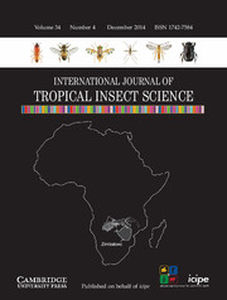Article contents
Tradeoff Between Longevity and Fecundity in Relation to Host Availability in a Thelytokous Oophagous Parasitoid, Trichogramma brasiliensis Ashmead (Trichogrammatidae: Hymenoptera)
Published online by Cambridge University Press: 19 September 2011
Abstract
The biological hypothesis that female parasitoids can adjust their fecundity schedule according to host availability, and tradeoff longevity with fecundity was tested in a thelytokous oophagous parasitoid, Trichogramma brasiliensis Ashmead (Trichogrammatidae: Hymenoptera) parasitising the rice moth, Corcyra cephalonica (Stainton) (Lepidoptera: Pyralidae). The tradeoff between early and late reproduction revealed that this wasp was able to exploit practically all available hosts during the first day or first few days of adult life. During spells of host unavailability, it was able to adjust its fecundity schedule accordingly. There was a negative relationship between survival and reproduction. Adult females survived shorter (10 days) when an unlimited supply of hosts was present, but longer (16 days) when no hosts were provided. These observations suggest the potential suitability of T. brasiliensis for inundative releases even in conditions of fluctuating host availability.
Keywords
- Type
- Research Articles
- Information
- International Journal of Tropical Insect Science , Volume 23 , Issue 3 , September 2003 , pp. 207 - 210
- Copyright
- Copyright © ICIPE 2003
References
- 2
- Cited by


